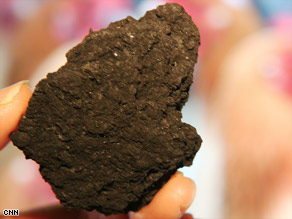Its high carbon content and porous nature can help soil retain water, nutrients, protect soil microbes and ultimately increase crop yields while acting as natural carbon sink - sequestering CO2 and locking it into the ground.
Biochar helps clean the air two ways: by preventing rotting biomass from releasing harmful CO2 into the atmosphere, and by allowing plants to safely store CO2 they pull out of the air during photosynthesis.

"Soil acts as an enormous carbon pool, increasing this carbon pool could significantly contribute to the reduction of CO2 in the atmosphere," said Christoph Steiner, one of the leading research scientist studying biochar. "It gives us a chance to produce carbon negative energy."
Worldwide use of biochar could cut CO2 levels by 8 parts per million within 50 years, according to NASA scientist James Hansen.
Global carbon levels in the air have been steadily increasing at an alarming rate since the 1980s, according to NOAA. Since 2000, increases of 2 parts per million of CO2 have been common, according to NOAA. During the 1980s rates increased by 1.5 ppm per year.
The process of making biochar can also lead to other valuable products.
Some of the gases given off during the process can be converted to electricity, others can be condensed and converted to gasoline, and there are also some pharmaceutical applications for the by-products, said Danny Day President and CEO of Eprida, a private firm in Athens, Georgia currently exploring industry applications for the biochar process.
Although scientists look to biochar to improve the future, its origin lies in the past.
For centuries indigenous South Americans living in the Amazon Basin used a combination of charred animal waste and wood to make "terra preta," which means black earth, in Portuguese.
Thousands of years later, the terra preta soil remains fertile without need for any added fertilizer, experts say.
"These terra preta soils are older than 500 years and they are still black soil and very rich in carbon," said Steiner, a professor at the University of Georgia. Reducing the need for deforestation to create more cropland.
By using biochar concepts, terra preta soils have been proven to remain fertile for thousands of years, preventing further harmful deforestation for agricultural purposes. But still more large-scale tests need to be conducted before biochar technology can be rolled out on a global scale.
Day says biomass -- that otherwise would be thrown away --could be developed into entirely new markets for biofuels, electricity, biomass extracts and pharmaceutical applications, in addition to biochar.




0 people have spoken:
Post a Comment